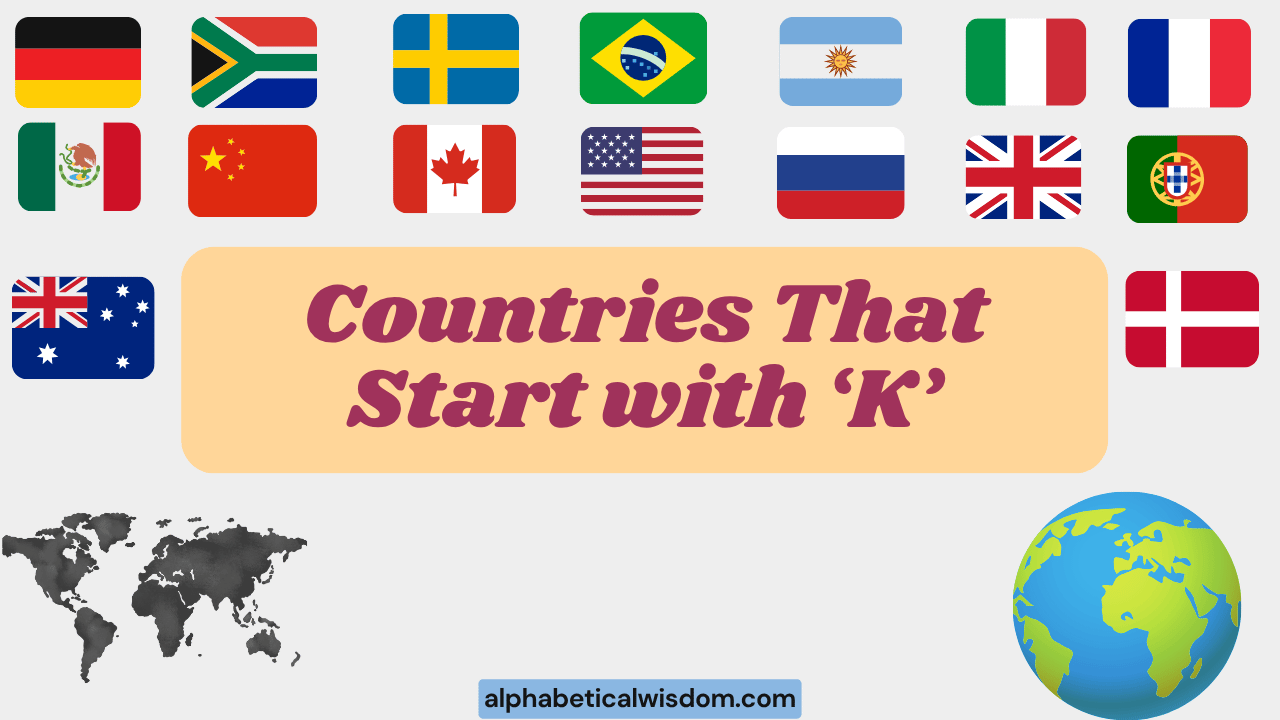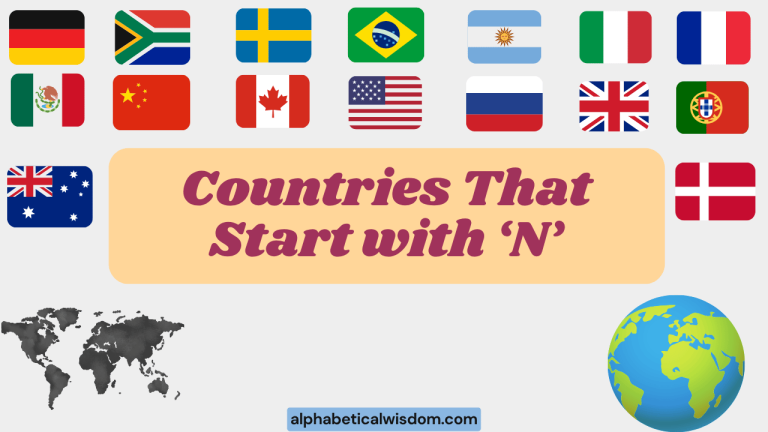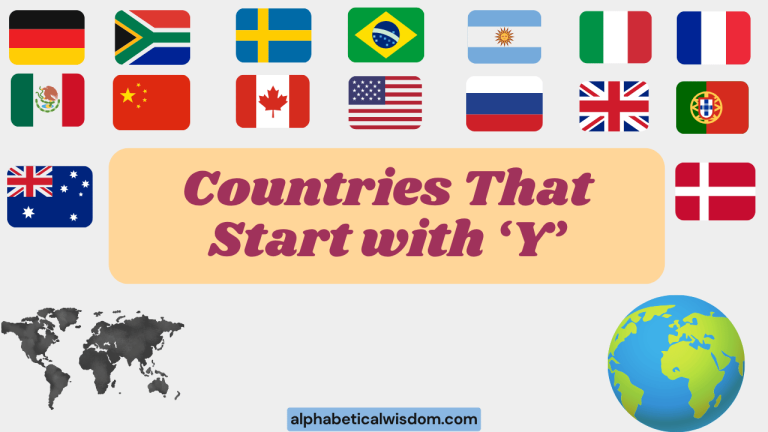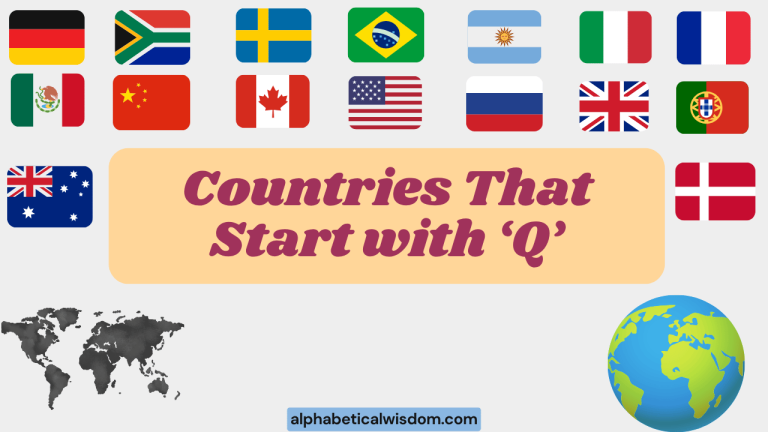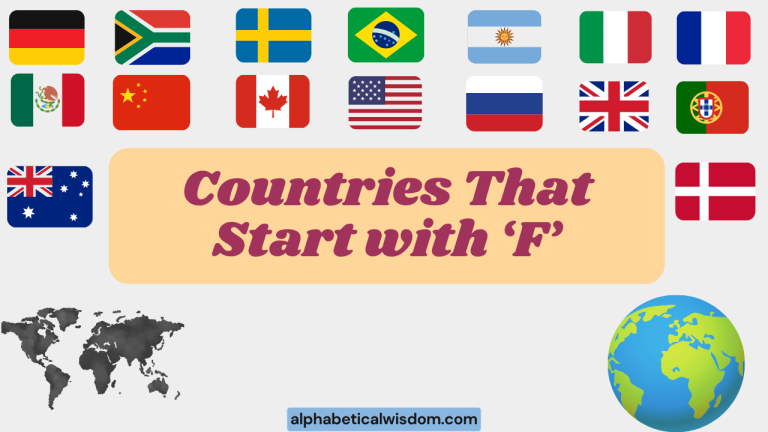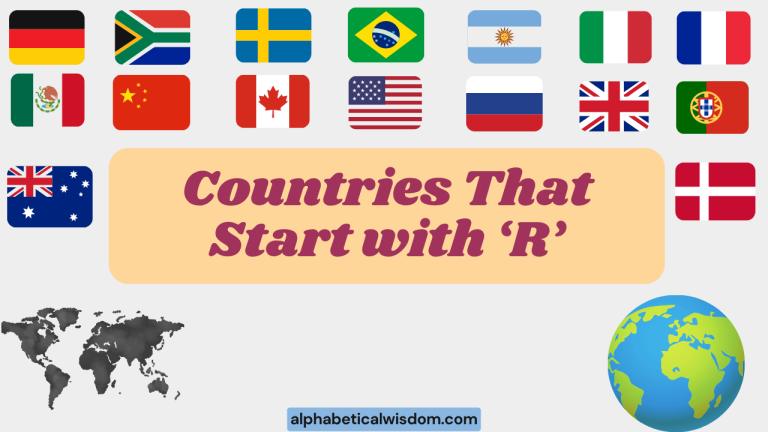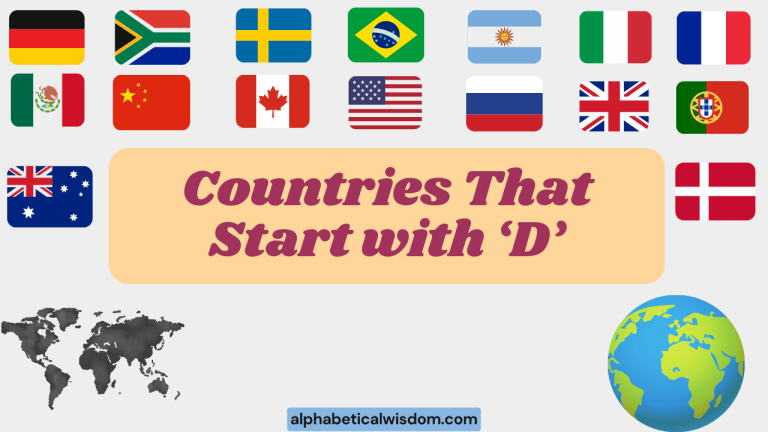Countries Starting With K: Grammar and Usage in English
Understanding how to correctly use country names in English is crucial for effective communication, whether in academic writing, professional settings, or casual conversation. Country names, especially those starting with the letter ‘K,’ present unique grammatical challenges and opportunities.
This article explores the proper usage of these names, focusing on capitalization, articles, adjective forms, and common pitfalls. This guide is designed for English language learners, educators, and anyone seeking to improve their grammatical accuracy and cultural sensitivity.
Table of Contents
- Introduction
- Definition: Countries Starting with K
- Structural Breakdown
- Types and Categories
- Examples
- Usage Rules
- Common Mistakes
- Practice Exercises
- Advanced Topics
- FAQ
- Conclusion
Definition: Countries Starting with K
In English grammar, a country name is a proper noun that refers to a specific sovereign state or territory. When referring to countries that begin with the letter ‘K,’ the same grammatical rules apply as with any other country name. These include proper capitalization, correct use of articles (when necessary), and appropriate adjectival forms. Understanding these nuances is essential for clear and accurate communication.
The primary function of a country name is to identify a geographical and political entity. These names are used in a variety of contexts, from news reports and academic papers to everyday conversations. For countries starting with ‘K’, such as Kazakhstan, Kenya, Kiribati, Kuwait, Kyrgyzstan, and North and South Korea, it’s important to understand the specific grammatical rules associated with each name.
The context in which a country name is used often dictates the specific grammatical requirements. For example, when discussing the geography of a region, you might refer to “the mountains of Kyrgyzstan.” When discussing international relations, you might say, “Kazakhstan is a member of the United Nations.” In each case, the correct usage depends on the sentence structure and the intended meaning.
Structural Breakdown
The structural breakdown of using countries starting with ‘K’ involves understanding a few key elements. First, these names are always capitalized because they are proper nouns.
Second, the use of articles (like “the”) depends on the specific country name and the context in which it is used. Third, each country name has an adjectival form that is used to describe things related to that country.
Understanding these elements will help you to construct grammatically correct sentences.
Proper nouns, like country names, follow specific structural rules. They are typically not preceded by articles unless the country name itself includes “the” (e.g., “the United Kingdom”).
Adjectival forms are derived from the country name and are used to modify other nouns (e.g., “Kenyan coffee”). The correct usage of these forms ensures clarity and precision in communication.
Let’s consider the structure using examples. In the sentence, “I visited Kazakhstan last year,” ‘Kazakhstan’ is the proper noun acting as the direct object of the verb ‘visited.’ The sentence structure is simple: Subject (I) + Verb (visited) + Object (Kazakhstan). Alternatively, “The culture of Kuwait is fascinating,” ‘Kuwait’ is used possessively with the preposition ‘of.’ The structure is: Subject (The culture of Kuwait) + Verb (is) + Complement (fascinating).
Types and Categories
Sovereign States
Sovereign states are independent political entities with defined territories and governments. When referring to countries starting with ‘K’ that are sovereign states, it is essential to use the correct name and capitalization.
These countries include Kazakhstan, Kenya, Kiribati, Kuwait, Kyrgyzstan, and both North and South Korea.
For example, “Kenya gained independence in 1963.” Here, Kenya is used as a proper noun referring to the sovereign state. Similarly, “Kyrgyzstan’s economy is largely based on agriculture.” In this case, Kyrgyzstan is used to specify a country with its own government and economic system.
Dependent Territories
Dependent territories are regions that are controlled by another country but are not fully integrated into it. While there may not be any current dependent territories that start with “K,” understanding this category is important for general grammatical knowledge.
Historically, some regions might have had different statuses.
If a dependent territory starting with “K” existed, the usage would be similar to other dependent territories. For instance, one might say, “The administration of [Territory Name] is overseen by [Controlling Country].” The key is to accurately identify the territory’s status and the country responsible for its governance.
Historical Entities
Historical entities refer to countries or regions that existed in the past but no longer exist in their original form. When discussing historical entities starting with ‘K,’ it is important to use the correct historical context and terminology.
This often involves referencing specific time periods and political situations.
For example, if discussing the Korean Empire before the division of Korea, one might say, “The Korean Empire was annexed by Japan in 1910.” This requires understanding the historical context and using the appropriate name for the entity as it existed at that time. Accuracy in historical references is crucial for avoiding misunderstandings.
Examples
General Usage
General usage refers to the everyday use of country names in various contexts. This includes news reports, casual conversations, and academic discussions.
The key is to use the correct name, capitalization, and article (if necessary) for each country.
For example, “I am planning a trip to Kenya next year.” Here, ‘Kenya’ is used in a straightforward manner to indicate the destination. Another example is, “Kazakhstan is known for its vast steppes.” In this sentence, ‘Kazakhstan’ is used to provide context about a geographical feature.
The table below provides more examples of general usage of countries starting with ‘K’:
| Sentence | Country Name | Context |
|---|---|---|
| “The capital of Kuwait is Kuwait City.” | Kuwait | Geographical information |
| “Kyrgyzstan is a landlocked country in Central Asia.” | Kyrgyzstan | Geographical location |
| “Kenya is famous for its wildlife safaris.” | Kenya | Tourism and attractions |
| “Kiribati is composed of many atolls.” | Kiribati | Geographical composition |
| “Kazakhstan has a diverse cultural heritage.” | Kazakhstan | Cultural aspects |
| “South Korea is a technological hub.” | South Korea | Economic status |
| “North Korea remains politically isolated.” | North Korea | Political situation |
| “I have a friend from Kuwait.” | Kuwait | Personal connection |
| “She studied abroad in Kenya.” | Kenya | Educational experience |
| “The mountains in Kyrgyzstan are breathtaking.” | Kyrgyzstan | Geographical features |
| “Kiribati faces challenges due to rising sea levels.” | Kiribati | Environmental issues |
| “Kazakhstan is rich in natural resources.” | Kazakhstan | Economic resources |
| “South Korea is known for its K-pop music.” | South Korea | Cultural exports |
| “North Korea’s political system is unique.” | North Korea | Political structure |
| “My favorite dish is Kenyan stew.” | Kenya | Culinary preferences |
| “Kyrgyzstan’s flag is very symbolic.” | Kyrgyzstan | National symbols |
| “Kuwait’s economy relies heavily on oil.” | Kuwait | Economic reliance |
| “Kiribati’s culture is deeply rooted in tradition.” | Kiribati | Cultural traditions |
| “Kazakhstan’s landscape is diverse.” | Kazakhstan | Landscape diversity |
| “South Korea is a popular tourist destination.” | South Korea | Tourism popularity |
| “North Korea’s history is complex.” | North Korea | Historical complexity |
| “I want to learn more about Kenyan history.” | Kenya | Historical interest |
| “Kyrgyzstan is a beautiful country to visit.” | Kyrgyzstan | Tourism appeal |
| “Kuwait is an important player in the Middle East.” | Kuwait | Regional importance |
Adjectival Forms
Adjectival forms are used to describe something that is related to a particular country. For countries starting with ‘K,’ these forms are essential for creating descriptive and accurate sentences.
For example, ‘Kazakhstani’ is the adjectival form of ‘Kazakhstan,’ ‘Kenyan’ for Kenya, ‘Kiribati’ for Kiribati, ‘Kuwaiti’ for Kuwait, ‘Kyrgyz’ for Kyrgyzstan, and ‘Korean’ for Korea. Note that ‘Korean’ applies to both North and South Korea.
For example, “Kazakhstani culture is rich in tradition.” Here, ‘Kazakhstani’ modifies ‘culture’ to indicate that it is the culture of Kazakhstan. Similarly, “Kenyan coffee is highly prized around the world.” ‘Kenyan’ modifies ‘coffee’ to specify its origin.
The following table provides more examples of the adjectival forms of countries starting with ‘K’:
| Sentence | Adjectival Form | Country Name |
|---|---|---|
| “The Kazakhstani government is working on economic reforms.” | Kazakhstani | Kazakhstan |
| “Kenyan athletes are known for their long-distance running abilities.” | Kenyan | Kenya |
| “Kiribati traditions are passed down through generations.” | Kiribati | Kiribati |
| “Kuwaiti oil reserves are among the largest in the world.” | Kuwaiti | Kuwait |
| “Kyrgyz carpets are famous for their intricate designs.” | Kyrgyz | Kyrgyzstan |
| “Korean technology is highly advanced.” | Korean | South Korea/North Korea |
| “I enjoy listening to Kazakhstani music.” | Kazakhstani | Kazakhstan |
| “She is wearing a Kenyan dress.” | Kenyan | Kenya |
| “The Kiribati people are very welcoming.” | Kiribati | Kiribati |
| “He works for a Kuwaiti company.” | Kuwaiti | Kuwait |
| “Kyrgyz hospitality is well-known.” | Kyrgyz | Kyrgyzstan |
| “Korean cuisine is very popular.” | Korean | South Korea/North Korea |
| “The Kazakhstani economy is growing.” | Kazakhstani | Kazakhstan |
| “Kenyan wildlife is a major tourist attraction.” | Kenyan | Kenya |
| “Kiribati culture is unique.” | Kiribati | Kiribati |
| “Kuwaiti architecture is modern.” | Kuwaiti | Kuwait |
| “Kyrgyz traditions are ancient.” | Kyrgyz | Kyrgyzstan |
| “Korean dramas are globally popular.” | Korean | South Korea/North Korea |
| “Kazakhstani art is vibrant.” | Kazakhstani | Kazakhstan |
| “Kenyan landscapes are stunning.” | Kenyan | Kenya |
Geographical References
When referring to geographical features or regions within countries starting with ‘K,’ it is important to use the correct terminology and context. This includes mountains, rivers, cities, and other geographical landmarks.
For example, “The Tian Shan mountains run through Kyrgyzstan.” Here, ‘Kyrgyzstan’ provides the geographical context for the mountain range. Another example is, “Kuwait City is located on the Persian Gulf.” ‘Kuwait City’ is geographically referenced within the country of Kuwait.
The table below provides examples of geographical references:
| Sentence | Country Name | Geographical Feature |
|---|---|---|
| “Lake Issyk-Kul is located in Kyrgyzstan.” | Kyrgyzstan | Lake Issyk-Kul |
| “The Great Rift Valley runs through Kenya.” | Kenya | Great Rift Valley |
| “Tarawa is the capital atoll of Kiribati.” | Kiribati | Tarawa |
| “The Burgan oil field is in Kuwait.” | Kuwait | Burgan oil field |
| “Almaty is a major city in Kazakhstan.” | Kazakhstan | Almaty |
| “Seoul is the capital of South Korea.” | South Korea | Seoul |
| “Mount Kenya is the highest peak in Kenya.” | Kenya | Mount Kenya |
| “The Syr Darya river flows through Kazakhstan.” | Kazakhstan | Syr Darya river |
| “The islands of Kiribati are spread across the Pacific Ocean.” | Kiribati | Islands of Kiribati |
| “Kuwait Bay is a significant coastal feature.” | Kuwait | Kuwait Bay |
| “Bishkek is the capital city of Kyrgyzstan.” | Kyrgyzstan | Bishkek |
| “The coastline of Kenya is beautiful.” | Kenya | Kenyan Coastline |
| “The Caspian Sea borders Kazakhstan.” | Kazakhstan | Caspian Sea |
| “The terrain of Kyrgyzstan is mostly mountainous.” | Kyrgyzstan | Kyrgyzstan Terrain |
| “The desert landscape in Kuwait is vast.” | Kuwait | Kuwait Desert |
| “The atolls of Kiribati are low-lying.” | Kiribati | Kiribati Atolls |
Cultural References
Cultural references involve using country names in the context of art, music, literature, cuisine, and other cultural aspects. This requires sensitivity and accuracy to avoid misrepresentation.
For countries starting with ‘K,’ this includes Kazakhstani music, Kenyan art, Kiribati traditions, Kuwaiti cuisine, and Korean pop culture.
For example, “Korean dramas are popular worldwide.” Here, ‘Korean’ refers to the culture of South Korea and its influence on global entertainment. Similarly, “Kenyan music often incorporates traditional rhythms and instruments.” In this case, ‘Kenyan’ is used to describe the cultural context of music from Kenya.
Here’s a table with more examples:
| Sentence | Country Name | Cultural Aspect |
|---|---|---|
| “Kazakhstani folk music is rich in history.” | Kazakhstan | Folk Music |
| “Kenyan art often reflects the country’s wildlife.” | Kenya | Art |
| “Kiribati dances are an important part of their culture.” | Kiribati | Dances |
| “Kuwaiti cuisine includes many seafood dishes.” | Kuwait | Cuisine |
| “Kyrgyz traditional clothing is very colorful.” | Kyrgyzstan | Traditional Clothing |
| “Korean pop music (K-pop) has a global following.” | South Korea | Pop Music |
| “Kazakhstani hospitality is highly valued.” | Kazakhstan | Hospitality |
| “Kenyan storytelling is a rich oral tradition.” | Kenya | Storytelling |
| “Kiribati handicrafts are unique and beautiful.” | Kiribati | Handicrafts |
| “Kuwaiti architecture blends modern and traditional styles.” | Kuwait | Architecture |
| “Kyrgyz epic poems are passed down through generations.” | Kyrgyzstan | Epic Poems |
Political Contexts
Using country names in political contexts requires accuracy and awareness of current events and international relations. This includes discussions about government, international agreements, and political situations within the country.
For example, “Kazakhstan is a member of the Shanghai Cooperation Organisation.” Here, ‘Kazakhstan’ is used in the context of international politics and membership in a specific organization. Another example is, “Kenya’s government is working to improve infrastructure.” ‘Kenya’ is used to specify the government of that country.
Here’s a table with more examples:
| Sentence | Country Name | Political Context |
|---|---|---|
| “Kuwait plays a significant role in OPEC.” | Kuwait | OPEC Membership |
| “Kyrgyzstan has been undergoing political reforms.” | Kyrgyzstan | Political Reforms |
| “Kenya participates in various UN peacekeeping missions.” | Kenya | UN Peacekeeping |
| “Kazakhstan’s foreign policy focuses on regional stability.” | Kazakhstan | Foreign Policy |
| “North Korea’s nuclear program is a global concern.” | North Korea | Nuclear Program |
| “South Korea has strong diplomatic ties with the United States.” | South Korea | Diplomatic Ties |
| “Kiribati is addressing the impacts of climate change.” | Kiribati | Climate Change Policy |
Usage Rules
Capitalization
Country names, being proper nouns, must always be capitalized. This rule applies to all countries starting with ‘K,’ including Kazakhstan, Kenya, Kiribati, Kuwait, Kyrgyzstan, and both North and South Korea.
Proper capitalization is essential for grammatical correctness and clarity.
For example, it is correct to write “I visited Kazakhstan last year” and incorrect to write “I visited kazakhstan last year.” Similarly, “Kenya is famous for its wildlife” is correct, while “kenya is famous for its wildlife” is incorrect. Always ensure that the first letter of the country name is capitalized.
Articles (The vs. No Article)
The use of articles (such as “the”) before country names can be tricky. Most country names do not require an article.
However, there are exceptions, particularly when the country name includes words like “United,” “Republic,” or “Kingdom.” For countries starting with ‘K,’ the general rule is that no article is used unless the name specifically requires it.
For example, you would say “I traveled to Kazakhstan” (no article) but “I traveled to the Republic of Korea” (with article when using the full formal name). Note that when referring to Korea generally, we don’t use an article: “Korea has a rich history” or “Korean culture is vibrant“.
Possessive Forms
To indicate possession or a relationship to a country, use the possessive form by adding an apostrophe and an ‘s’ (‘s) to the country name. For example, “Kazakhstan’s economy is growing” shows possession. If the country name ends in ‘s,’ you can either add an apostrophe and an ‘s’ or just an apostrophe, depending on style preferences. For example, “Kyrgyzstan’s” or “Kyrgyzstans’.”
For example, “Kenya’s wildlife is world-renowned” indicates that the wildlife belongs to Kenya. Similarly, “Kuwait’s oil reserves are significant” shows that the oil reserves are associated with Kuwait.
Compound Nouns
When a country name is used as part of a compound noun, it functions as an adjective to describe the noun. In these cases, the country name retains its capitalized form. For example, “Kazakhstan border” or “Kenyan coffee.”
For example, “Kyrgyzstan mountains are beautiful” uses ‘Kyrgyzstan’ to describe the type of mountains. Similarly, “Kuwaiti oil field” uses ‘Kuwaiti’ (the adjectival form) to describe the type of oil field.
Formal vs. Informal Usage
In formal writing, it is important to use the full and official name of the country when appropriate. In informal contexts, shortened versions may be acceptable. For example, in a formal document, you might use “the Republic of Korea,” while in a casual conversation, “South Korea” is perfectly acceptable.
For example, in a formal report, you would write “The government of Kazakhstan announced new economic policies,” whereas, in a casual conversation, you might say “Kazakhstan is implementing new economic policies.” The key is to tailor your language to the context.
Common Mistakes
One common mistake is using lowercase letters for country names. Always capitalize country names. Another mistake is using the incorrect adjectival form. For example, saying “Kazakhstanian culture” instead of “Kazakhstani culture” is incorrect. Additionally, using an article (“the”) before country names that don’t require it is a frequent error. For example, writing “the Kenya” instead of “Kenya.”
Another common error is misusing possessive forms. For example, writing “Kazakhstan’s’ economy” instead of “Kazakhstan’s economy” is incorrect. Finally, using the wrong name for a country due to confusion is also a mistake. For example, mixing up Kyrgyzstan and Kazakhstan.
Here are some examples of correct vs. incorrect usage:
| Incorrect | Correct | Explanation |
|---|---|---|
| “I visited kazakhstan.” | “I visited Kazakhstan.” | Country names must be capitalized. |
| “The Kenya is a beautiful country.” | “Kenya is a beautiful country.” | Most country names do not need the article “the.” |
| “Kazakhstanian culture is rich.” | “Kazakhstani culture is rich.” | Use the correct adjectival form. |
| “Kyrgyzstan’s’ economy is growing.” | “Kyrgyzstan’s economy is growing.” | Correct possessive form. |
| “I am from kiribati.” | “I am from Kiribati.” | Country names must always be capitalized. |
| “The Kuwait has a rich history.” | “Kuwait has a rich history.” | Avoid using “the” before country names unless required. |
| “I love korean food.” | “I love Korean food.” | Adjectival forms must be capitalized. |
Practice Exercises
Exercise 1: Fill in the Blanks
Fill in the blanks with the correct country name or adjectival form.
| Question | Answer |
|---|---|
| 1. The capital of _________ is Bishkek. | Kyrgyzstan |
| 2. __________ coffee is famous worldwide. | Kenyan |
| 3. __________ is known for its oil reserves. | Kuwait |
| 4. __________ is an island nation in the Pacific. | Kiribati |
| 5. The __________ government is working on economic reforms. | Kazakhstani |
| 6. _________ dramas are very popular. | Korean |
| 7. The highest peak in _________ is Mount Kenya. | Kenya |
| 8. __________ is a landlocked country in Central Asia. | Kyrgyzstan |
| 9. __________ culture is rich and diverse. | Kazakhstani |
| 10. __________ faces challenges due to rising sea levels. | Kiribati |
Exercise 2: Correct the Errors
Identify and correct the errors in the following sentences.
| Incorrect Sentence | Correct Sentence |
|---|---|
| 1. i want to visit kenya next year. | I want to visit Kenya next year. |
| 2. the kazakhstan is a large country. | Kazakhstan is a large country. |
| 3. kyrgyzstanian culture is fascinating. | Kyrgyz culture is fascinating. |
| 4. the kiribati is a small island nation. | Kiribati is a small island nation. |
| 5. kuwait’s’ economy is based on oil. | Kuwait’s economy is based on oil. |
| 6. south korea is known for it’s technology. | South Korea is known for its technology. |
| 7. north korea is a country in asia. | North Korea is a country in Asia. |
| 8. i like kiribatis music. | I like Kiribati music. |
| 9. the government of kenya is working hard. | The government of Kenya is working hard. |
| 10. kyrgyzstan’s mountains are very high. | Kyrgyzstan’s mountains are very high. |
Exercise 3: Sentence Construction
Create sentences using the given words related to countries starting with ‘K’.
| Words | Example Sentence |
|---|---|
| Kazakhstan, capital, Astana | The capital of Kazakhstan is Astana. |
| Kenya, wildlife, safari | Kenya is famous for its wildlife safaris. |
| Kiribati, islands, Pacific | Kiribati is made up of many islands in the Pacific Ocean. |
| Kuwait, oil, economy | Kuwait’s economy is heavily reliant on oil. |
| Kyrgyzstan, mountains, Tian Shan | The Tian Shan mountains run through Kyrgyzstan. |
| South Korea, technology, advanced | South Korea is known for its advanced technology. |
| North Korea, politics, isolated | North Korea is politically isolated. |
| 🇰enya, coffee, export | Kenya exports high-quality coffee beans. |
| 🇰yrgyzstan, culture, nomadic | Kyrgyzstan has a rich nomadic culture. |
| 🇰uwait, gulf, persian | Kuwait is located on the Persian Gulf. |
Exercise 4: Multiple Choice
Choose the correct sentence from the options provided.
| Question | Options | Answer |
|---|---|---|
| 1. Which sentence is correct? | a) I am going to the Kazakhstan. b) I am going to Kazakhstan. c) I am going to Kazakhistan. | b) I am going to Kazakhstan. |
| 2. Which sentence is correct? | a) Kenyan coffee is the best. b) Kenya coffee is the best. c) Kenian coffee is the best. | a) Kenyan coffee is the best. |
| 3. Which sentence is correct? | a) Kuwait’s oil is valuable. b) Kuwaits oil is valuable. c) Kuwait oil is valuable. | a) Kuwait’s oil is valuable. |
| 4. Which sentence is correct? | a) Kiribati is beautiful. b) The Kiribati is beautiful. c) Kiribatis is beautiful. | a) Kiribatiis beautiful. |
| 5. Which sentence is correct? | a) The capital of Kyrgyzstan is Bishkek. b) The capital of Kyrgyzistan is Bishkek. c) The capital of Kirghizstan is Bishkek. | a) The capital of Kyrgyzstan is Bishkek. |
Advanced Topics
Idiomatic Expressions
Idiomatic expressions involving country names are relatively rare, but understanding them can add depth to your understanding of the language. These expressions often carry cultural or historical significance and may not be immediately obvious to non-native speakers.
For example, there may not be common idiomatic expressions specifically using countries starting with ‘K,’ but one might encounter phrases that allude to historical events or cultural stereotypes. It’s essential to research and understand the context behind these expressions to use them appropriately.
Historical Linguistics
The study of historical linguistics can provide insights into how country names have evolved over time. This includes changes in spelling, pronunciation, and usage.
Understanding the historical roots of country names can offer a deeper appreciation for their cultural and linguistic significance.
For countries starting with ‘K,’ examining their historical names and the influences of different languages can be particularly interesting. For example, the name ‘Korea’ has evolved through various transliterations and historical periods.
Similarly, the names of Central Asian countries like Kazakhstan and Kyrgyzstan reflect their Turkic origins and historical interactions with other cultures.
Cultural Sensitivity
When using country names, it is crucial to be culturally sensitive and avoid stereotypes or generalizations. This includes being aware of the country’s history, culture, and current political situation.
Using respectful and accurate language is essential for effective communication.
For example, when discussing North and South Korea, it is important to be mindful of the complex political relationship between the two countries and avoid language that could be considered offensive or insensitive. Similarly, when discussing Kazakhstan, Kenya, Kiribati, Kuwait, and Kyrgyzstan, it is important to respect their unique cultural identities and avoid making sweeping generalizations.
FAQ
Why is it important to use the correct capitalization for country names?
Using correct capitalization is essential because country names are proper nouns. Proper capitalization ensures clarity and grammatical correctness, which is crucial for effective communication.
When should I use the article “the” before a country name?
Generally, you should not use “the” before a country name unless the official name includes it (e.g., “the United Kingdom,” “the Republic of Korea”). Most country names, including those starting with ‘K,’ do not require an article.
How do I form the adjectival form of a country name?
The adjectival form varies for each country. For countries starting with ‘K,’ examples include ‘Kazakhstani’ (Kazakhstan), ‘Kenyan’ (Kenya), ‘Kiribati’ (Kiribati), ‘Kuwaiti’ (Kuwait), ‘Kyrgyz’ (Kyrgyzstan), and ‘Korean’ (Korea).
Use these forms to describe something related to that country.
What should I do if I’m unsure about the correct usage of a country name?
If you’re unsure, consult a reliable grammar guide, dictionary, or online resource. Additionally, pay attention to how native English speakers use country names in various contexts.
Why is cultural sensitivity important when using country names?
Cultural sensitivity is crucial because it shows respect for the country’s history, culture, and people. Using accurate and respectful language helps avoid misunderstandings and promotes positive communication.
Conclusion
Mastering the grammar and usage of country names, particularly those starting with ‘K,’ is essential for effective and culturally sensitive communication. By understanding the rules of capitalization, articles, adjectival forms, and possessive forms, you can enhance your English language skills and avoid common mistakes.
Whether in academic writing, professional settings, or casual conversations, using country names correctly will contribute to clearer, more accurate, and more respectful communication.
